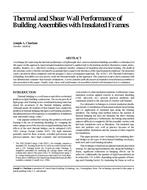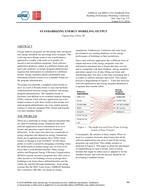High-rise commercial buildings have a potential for effectively using cool storage due to their cooling load profiles. This paper discusses the use of cold air distribution systems (43°F) in conjunction with ice storage as a means to further reduce peak power and energy consumption. An assessment was made of whether or not energy or cost savings could be achieved when applying these systems to a prototypical office building in six different climate regions. A description of the building and its HVAC system is presented. An algorithm for modelling the performance of an ice harvester was developed and used in conjunction with the Building Loads Analysis and System Thermodynamics (BLAST) computer program to simulate system performance. Four utility rate structures were used to determine the impact of rate variations on annual operating costs. In general, ice storage systems consumed slightly more energy on an annual basis even when cold air distribution was used. However, for the rate structures considered, ice storage systems with cold air distribution provided the lowest operating costs.
KEYWORDS: energy consumption, calculating, ice storage, energy storage, cold sources, air distribution, computer programs, weather, costs, commercial, multistorey buildings, cooling load, air conditioning.
Citation: ASHRAE Transactions, vol.96, pt. 1, Atlanta, 1990
Product Details
- Published:
- 1990
- Number of Pages:
- 10
- File Size:
- 1 file , 1.3 MB
- Product Code(s):
- D-18422


